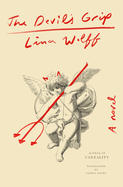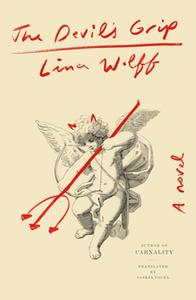
 Swedish writer and translator Lina Wolff (Carnality) crafts a magnetic fever dream in The Devil's Grip, a fast-paced novel, hypnotically translated by Saskia Vogel, about a woman pushed to the edge of sanity by an abusive relationship.
Swedish writer and translator Lina Wolff (Carnality) crafts a magnetic fever dream in The Devil's Grip, a fast-paced novel, hypnotically translated by Saskia Vogel, about a woman pushed to the edge of sanity by an abusive relationship.
A woman moves to Florence, Italy, from her home country and is overwhelmed by its romance and her own loneliness. But its dark corners begin to look more appealing after she pairs up with an unremarkable-looking man who goes by Mickey to her Minnie. Despite Mickey's lack of beauty, Minnie is drawn to him by his intensity, his control, and the way he makes her aware of her own body. Mickey, however, grows increasingly violent and disloyal in his sexual acts, and Minnie becomes convinced that their bodies are only vessels for the demons inside them both. No matter how much she wants to love Mickey, her demon lusts for his demise.
As Minnie becomes steadily more unwound, so does the plot. Yet despite the novel's progressively surrealist nature, Wolff's masterful prose keeps the story grounded in the precision and simplicity of language, the immediacy of bodily sensation, and the necessity of desire. For example, Wolff describes Minnie's attraction to Mickey through a variety of no-nonsense, deeply embodied details: his "masculinity... seeping from his pores," and his "sore spot, which he has now revealed to her. She knows where it is, and she can poke it with her finger." This form of palpable desire that persists throughout the novel makes almost anything--including the horrors that surround Minnie, real and imagined--seem possible.
Thematically, the book's heart lies in its raw but original depiction of intimate, gendered violence. Though Wolff rarely engages in the spectacle of showing physical abuse on the page, the novel's narrator often makes readers stare, mesmerized, at the material remnants of that violence. The emotional abuse Minnie suffers from Mickey is extreme; so, too, is the mental and emotional abuse she suffers at the hands of the larger world, which contributes to her destruction even as it attempts to help her. Minnie's seeming downward spiral notwithstanding, Wolff's novel avoids thinking of Minnie's arc as solely a destruction; instead, her arc is a struggle, not just against the man she thinks she loves, but against forces much greater than he could ever be. --Alice Martin, freelance writer and editor
Shelf Talker: A Lynchian drama about gendered, relational violence, Lina Wolff's The Devil's Grip is sure to mesmerize and terrify readers in equal measure.

